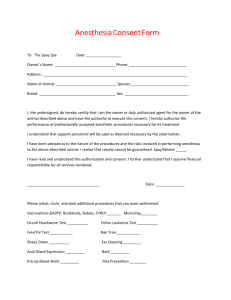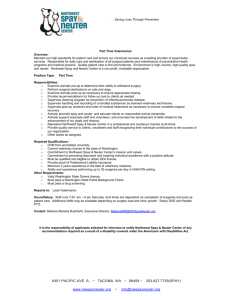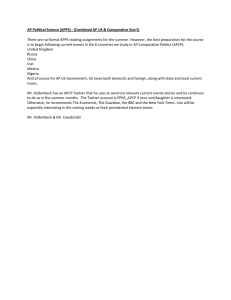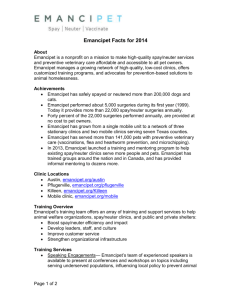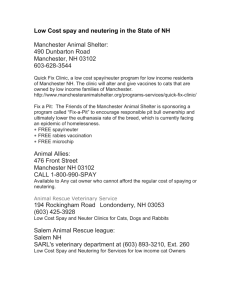New York State Animal Population Control Program (APCP)
advertisement
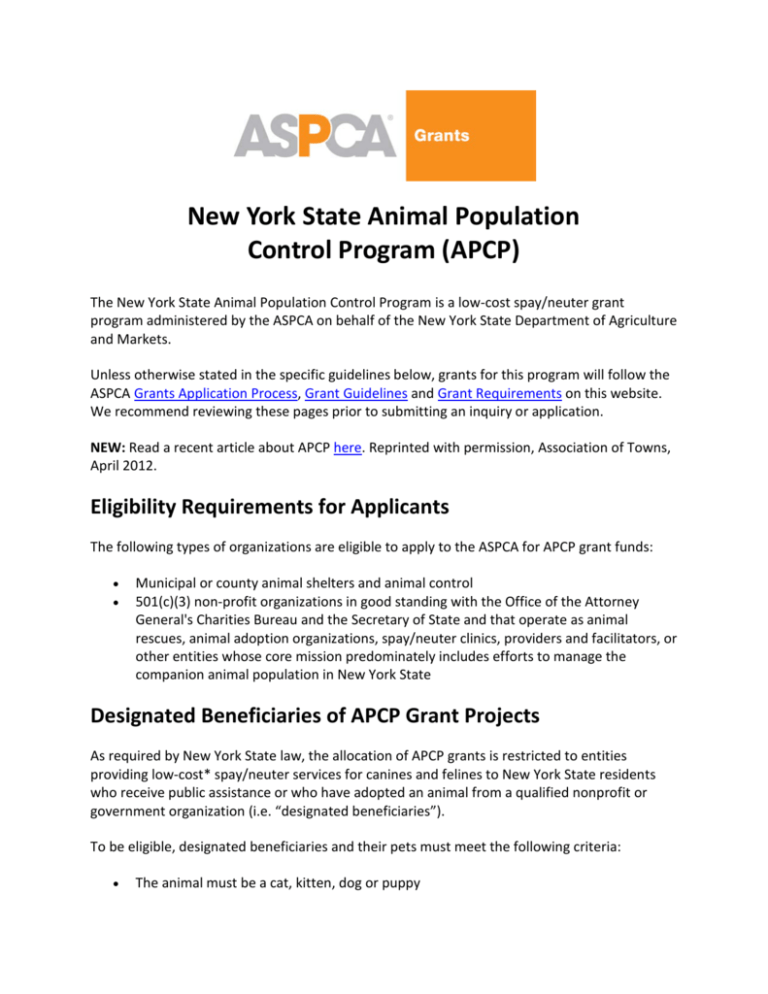
New York State Animal Population Control Program (APCP) The New York State Animal Population Control Program is a low-cost spay/neuter grant program administered by the ASPCA on behalf of the New York State Department of Agriculture and Markets. Unless otherwise stated in the specific guidelines below, grants for this program will follow the ASPCA Grants Application Process, Grant Guidelines and Grant Requirements on this website. We recommend reviewing these pages prior to submitting an inquiry or application. NEW: Read a recent article about APCP here. Reprinted with permission, Association of Towns, April 2012. Eligibility Requirements for Applicants The following types of organizations are eligible to apply to the ASPCA for APCP grant funds: • • Municipal or county animal shelters and animal control 501(c)(3) non-profit organizations in good standing with the Office of the Attorney General's Charities Bureau and the Secretary of State and that operate as animal rescues, animal adoption organizations, spay/neuter clinics, providers and facilitators, or other entities whose core mission predominately includes efforts to manage the companion animal population in New York State Designated Beneficiaries of APCP Grant Projects As required by New York State law, the allocation of APCP grants is restricted to entities providing low-cost* spay/neuter services for canines and felines to New York State residents who receive public assistance or who have adopted an animal from a qualified nonprofit or government organization (i.e. “designated beneficiaries”). To be eligible, designated beneficiaries and their pets must meet the following criteria: • The animal must be a cat, kitten, dog or puppy • • • The animal must NOT have been imported from outside the state The person presenting the animal for sterilization must provide proof of residence in New York State The person presenting the animal for sterilization must provide proof of ONE of the following forms of eligibility: o Participation in one of the following programs: food stamps, supplemental security income for the aged, blind and disabled, low-income housing assistance, Family Assistance, Safety Net Assistance, Medical Assistance or other similar programs suggested by applicants or the ASPCA and approved by the Agriculture and Markets Commissioner OR o Adoption from a government shelter or nonprofit animal welfare organization in New York State. (No proof of ownership shall be required given the difficulty in identifying a consistent or decisive form of proof, especially with respect to cats (e.g., barn cats); therefore, only proof of low-income assistance or adoption from an eligible shelter shall be required.) Regardless of the above criteria, animals adopted from organizations whose adoption fees include the cost of spay/neuter services are NOT eligible for spay/neuter services through grant projects funded with APCP funds. * Low-cost is defined as substantially less than the average cost in the applicant's service area for spaying or neutering services, which may include any and all ancillary changes for services, including, but not limited to, pre-surgical examinations, tests and immunizations, and other services related to spay or neuter procedures. Additional Guidelines for Proposals • • • • Projects that cannot reasonably be limited to the designated beneficiaries and will therefore benefit other populations are eligible as long as the applicant can demonstrate that the project will provide significant outreach to and impact on the designated beneficiaries. When feasible, the requested amount should reflect only the pro-rated cost of the program that will benefit the intended APCP beneficiaries. Projects that include or result in direct spay/neuter services to designated beneficiaries must include a co-pay of at least one dollar per animal to be paid by the person presenting the animal(s) for sterilization. All veterinary services provided to animals targeted with APCP funds must be performed by a veterinarian licensed in New York State. Only feral cats who are owned by New York residents who qualify for accepted forms of public assistance may receive spay/neuter services through APCP grants. Proposals may include the following types of funding requests: • • • • • • • • • Co-pay or voucher or similar programs that provide direct spay/neuter services to eligible pet parents (such programs must include a co-payment of at least one dollar per animal; tiered co-pay schedules are encouraged when prudent) o Note that shelters may use APCP grant funds to provide spay/neuter services prior to the release of a dog or cat only where there is a signed adoption agreement. Infrastructure, capital improvements and equipment that result in an increase in the number of low-cost spay/neuter procedures and a decrease in the costs of such procedures during and/or beyond the grant term. Spay/neuter events designated for or that include designated populations. Targeted spay/neuter programs that identify a local need or problem, such as pets in low- income families or specific types or breeds of pets within a targeted geographic area or neighborhood. Payroll and expense support for new staff hires, including veterinarians, vet techs or other staff who will play a significant role in providing low-cost spay/neuter services to designated beneficiaries. Mobile and MASH-style spay/neuter programs, including equipment, vehicles and costs associated with vehicles. Stipends for costs, including fees and travel expenses, associated with the training of staff and veterinarians in low-cost spay/neuter techniques for High-Quality High-Volume Spay/Neuter (HQHVSN) at Humane Alliance in Asheville, North Carolina, and participation in the ASPCA's National Spay/Neuter Project (stipend eligibility is contingent upon successful applications to either of these programs). Costs associated with the implementation, expansion and sustainability of HQHVSN programs. Other projects that either directly or indirectly provide demonstrable low-cost spay/neuter services to designated beneficiaries. A detailed project description for each project is required on the application and must include the following information: • • • • • • • Clearly identified method of providing low-cost spay/neuter services Anticipated fee schedule for these services Size and need of the targeted populations Plan for outreach and promotion of services Demonstration or evidence of experience and qualifications for providing low-cost spay/neuter services Project's cost-effectiveness List of partner organizations and veterinarians that will provide spay/neuter services Evaluation The ASPCA will evaluate all approved grants during and at the end of the grant term. Grantees agree to present reports and other evidence on the use of the grant funds to verify compliance with ASPCA standards and APCP funding rules. The ASPCA may require that grants for projects that provide direct spay/neuter services to designated beneficiaries submit a periodic progress report identifying the age, species and sex of the animals altered, the name of the agency from which the animal was adopted or the type of eligible public assistance, and the county of residence. Please read the Grant Requirements section of this website for an explanation of typical grant reporting requirements grantees may be asked to fulfill. How to Apply To be considered for a grant, you must submit your request online through this link: Application for New York State APCP Spay/Neuter Grants Please Note: • • • • • • Submit one project per application. Multiple applications are encouraged if your organization is seeking APCP funding for more than one project. Counties applying for exemption should submit one request with a synopsis of their entire plan, regardless of the number of projects in their plan. Please refer to the ASPCA's general requirements for a list of documentation you may be asked to submit with your grant application. Organizations may reapply through the normal process at any time for consideration for additional APCP funds. There are no deadlines to submit applications. There are no minimums or maximums for requested grant amounts. However, funded grant amounts may differ from requested amounts. Incomplete applications will not be considered. Animal Population Control Program guidelines are subject to change based on legal interpretation and any future amendments to the state law that created it. Please be understanding if your proposals or elements of your proposals are deemed ineligible for APCP funding following review by ASPCA staff for both quality and adherence to the provisions of the law. Note: Requests for Exemption County governments may apply for exemption from the state APCP fund to administer their own program. Exemption obligates counties to use future animal license surcharges collected by municipalities within county borders for their approved APCP county plan. Such applications are subject to review and approval by the ASPCA, which is mandated by its agreement with the State of New York and the state law establishing the APCP to make its assessment of all applications based on the quality of proposed projects. Organizations, including municipal agencies, based in or serving counties that the ASPCA approves for exemption, are not eligible to receive APCP funding from the ASPCA-administered state fund, except for projects that serve animals outside the borders of such counties. County exemption applications must include the following information: • • Anticipated revenue from municipal license surcharges from September 2011 through December 2015 A cost-benefit analysis of APCP exemption vs. participation which clearly demonstrates the county's ability to provide a higher number of low-cost spay/neuter services at a lower program cost through a county-administered plan than would be provided to eligible applicants by APCP Please note: • • • Counties may apply for exemption from the APCP. Organizations in counties that are exempt from the APCP are ineligible to apply for APCP funds intended to finance spay/neuter services within the exempt county. Organizations located in counties that are exempt from the APCP may apply for APCP funds for spay/neuter services if those services will be provided in other counties.

